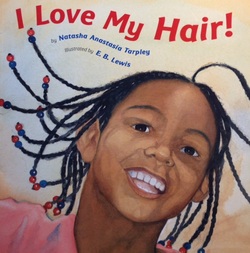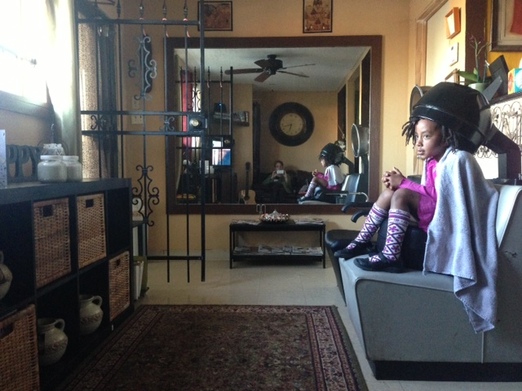Hair in general, is not only an integral part of one's self esteem, it holds tremendous symbolic significance socially, particularly for women. I could write a PhD dissertation about this. But in the name of being brief, one can ask these questions to get a sense of the answers: What is one of the more difficult parts of cancer treatment? How difficult would it be for you to shave your head, or be bald? How much money do people spend on hair dressers, curling straight hair, straightening curly hair, cutting, trimming, coloring, styling? What does going out in public without brushing/caring/washing your hair feel like? Why do so many societies have women cover their hair as a major religious dogma? What happened to Samson when he cut his hair?
For descendants of Africans, living amongst Caucasians, this has been an even more symbolic journey. For this community, whose (beautiful) skin color is permanent, being able to change their (beautiful) hair has been the one thing that they have control over, in order to feel more integrated in a mainly Caucasian society. Until today, much effort is made, to use what technology and means (which are often highly unhealthy, terribly expensive and unimaginably time consuming) are available, in hoping to achieve the feeling that hair is the great equalizer. And that has been, for the most part (despite the noble efforts of the Black Panther, Black is Beautiful, and embrace the Afro-look), the status-quo. Thankfully, there is a new movement under way, that is re-embracing the Natural look of Black Hair (check out Oprah Magazine September 2013 issue). If you're interested in finding out more about this, a good place to start is Good Hair, a documentary by Chris Rock.
And now comes the bit from my experience, where I hope to shine a light, and perhaps an "a-ha" moment for some. Non-black people, who have hair ranging from silk straight to very curly, just don't have the slightest idea, how much time, effort and often pain (not to mention money) is involved in taking care of African hair, especially girls' hair. This was a complete cultural shock for me, with a learning curve as steep as Mt Everest, and I'm still at base camp. We're talking about thousands of years of inherited experience, combing techniques, styles, products, vocabulary, scheduling, tactics for dealing with pain and sitting time. This hair, so beautiful and amazing to me, so malleable and deep in expression, is very (from here on, when I write the word very, read VERY to the power of 10) difficult to take care of and very time consuming. It has to be combed properly daily, so as not to get tangled and knotted. But combing it is an art form that is very hard, and if you have a tender-headed* daughter like mine, it is full of suffering, pain, screams, wails and tears. Often, little kids wear elaborate hair-dos, which are breathtakingly beautiful, and serve not only the purpose of removing the unruly hair stigma, and helping create an image of beauty and tidiness, but also help with the maintenance of the hair, a hair-do having the life of a week or more, in which time it does not require much attention. Seriously, you have no idea what effort was involved in producing those hair-dos. Please appreciate that.

Despite the fact that she gets compliments on her hair all the time, which is great, she also has not been able to dodge the fact that her hair is different from a lot of other kids', and, as she sees it, not in a good way. She does, after all, live in a world of blond Barbies (despite also having the token Tiana and a couple of other brown-skinned dolls - which I'm grateful for ), and a majority of girls at school with long straight hair. She has come home crying several times, wishing that she had straight golden hair like some of her friends. She has come home crying, because one of her "pink-skinned" friends told her she would not invite her to her birthday party because she was only inviting girls with straight hair. She has heard "the talk" from me many times, about how everyone looks different, and how that is a good thing. About how her hair is so unique and beautiful. But she still suffers through the physical pain of getting it done, and will inevitably wish for her hair to be different.
What I cannot tell you is into how many pieces her heart would be broken if her school told her that her hair was inappropriate, and that she could no longer attend her school because of her hair. That, my friend, is a hurt you don't recover from.
It's time for this non-sense to stop.

*tender-headed= I have not found an official scientific definition of this, but within the African American community, it is a term widely used to describe some people, especially some kids, that have extremely sensitive scalps, and suffer intense pain when their hair is being combed, parted , twisted or braided.

 RSS Feed
RSS Feed